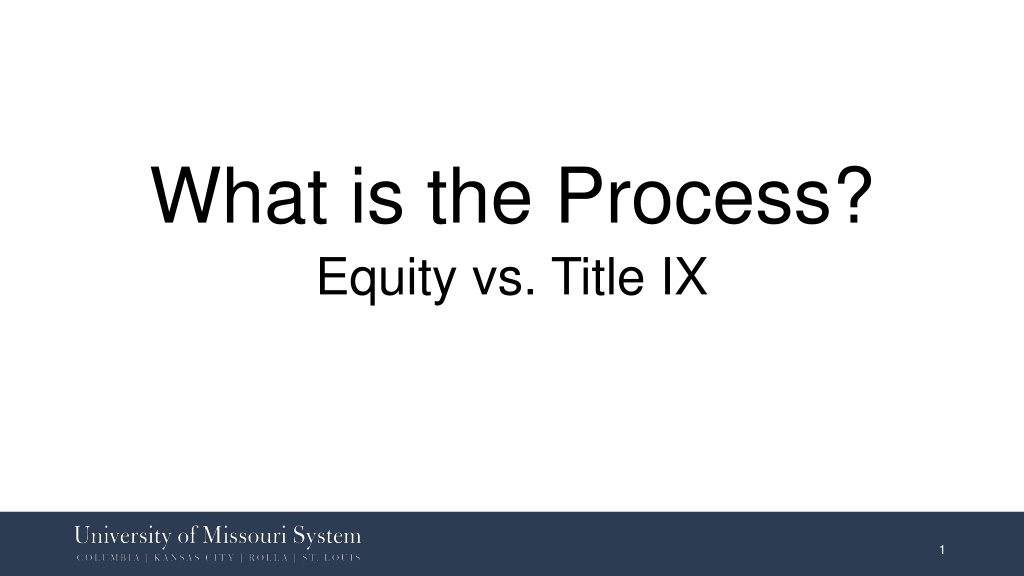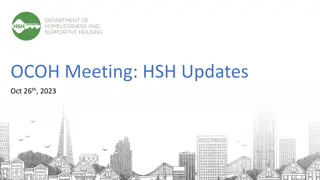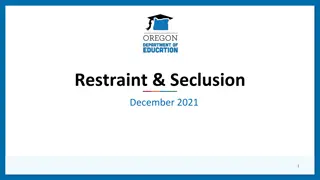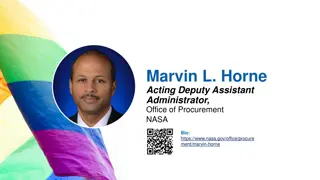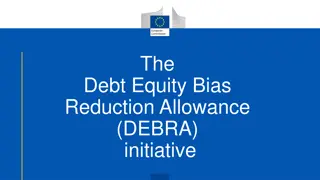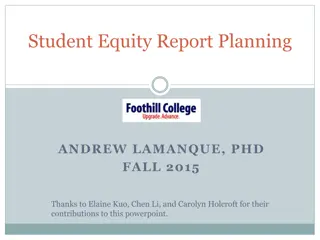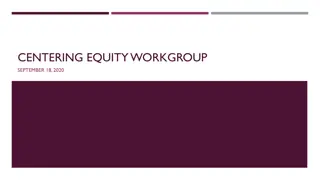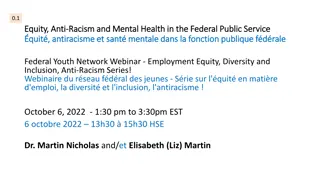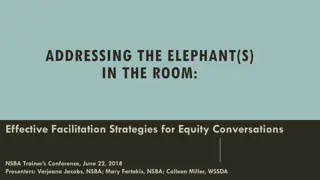Equity and Title IX Policies
Explore the differences between Equity and Title IX complaints, focusing on resolution processes for discrimination and harassment cases. Learn about the specific policies and procedures outlined for handling complaints related to various forms of misconduct.
Download Presentation

Please find below an Image/Link to download the presentation.
The content on the website is provided AS IS for your information and personal use only. It may not be sold, licensed, or shared on other websites without obtaining consent from the author.If you encounter any issues during the download, it is possible that the publisher has removed the file from their server.
You are allowed to download the files provided on this website for personal or commercial use, subject to the condition that they are used lawfully. All files are the property of their respective owners.
The content on the website is provided AS IS for your information and personal use only. It may not be sold, licensed, or shared on other websites without obtaining consent from the author.
E N D
Presentation Transcript
What is the Process? Equity vs. Title IX 1
The Revised CRRs 600.010: Equal Employment/ Educational Opportunity and Nondiscrimination Policy 600.020: Sexual Harassment under Title IX 600.030: Resolution Process for Resolving Complaints of Sexual Harassment under Title IX 600.040: Equity Resolution Process for Resolving Complaints of Discrimination and Harassment against a Faculty Member or Student or Student Organization 600.050: Equity Resolution Process for Resolving Complaints of Discrimination or Harassment against a Staff Member or the University of Missouri 2
What are the differences between 600.010 (Equity) and 600.020 (Title IX)? 600.010 pertains to Equity complaints; these are complaints of discrimination or harassment based on an individual s race, color, national origin, ancestry, religion, sexual orientation, age disability, protected veteran status, sex discrimination as defined in 600.010, and any other status protected by law. Sex discrimination under 600.010 means: sexual harassment that falls outside the definition of sexual harassment under 600.020, and includes workplace sexual harassment and sex discrimination that does not involve conduct of a sexual nature. 600.020 applies to sexual harassment occurring in an education program or activity of the University against a person in the United States. Sexual Harassment under 600.020 means conduct on the basis of sex that is: Quid pro quo Hostile environment Sexual assault Dating Violence Domestic violence Stalking 3
600.030: The Resolution Process for complaints of sexual harassment under Title IX. This process is available to students and all employees who are named as Respondents. Under this process, Parties have a right to a hearing with cross-examination and other questioning conducted by Advisors. The decision-maker for the hearing process is a hearing panel consisting of a Hearing Officer and two individuals randomly chosen from the Equity Resolution Hearing Panel Pool; will try to have panel consist of a faculty member and staff member/administrator from the Pool. For conduct falling under 600.020, the Resolution Process is 600.030. 4
For conduct falling under 600.010, the Resolution Process is 600.040: For complaints of discrimination or harassment against a faculty member, student or student organization. 600.050: For complaints of discrimination or harassment against a staff member or the University. either 600.040 or 600.050. 5
600.040 vs. 600.050 Equity Resolution Processes 600.040 provides for a resolution process that includes the following: oConflict Resolution oAdministrative Resolution oHearing Panel Process 600.050 provides for a resolution process that includes the following: oConflict Resolution oAdministrative Resolution 6
Jurisdiction of the University under 600.030 (Title IX) Jurisdiction of the University under this policy is limited to sexual harassment which occurs in an education program or activity of the University against a person in the United States. Does not apply to sexual harassment occurring outside of the United States, even where the conduct occurs in an education program or activity of the University. 7
Jurisdiction of the University under 600.040 or 600.050 (Equity) Limited to conduct which occurs on University premises or at University-sponsored or University-supervised functions. However, the University may take action for conduct occurring in other settings, including off-campus under certain circumstances. 8
Making a report and Preliminary Contact under 600.030 (Title IX): Any person may report sexual harassment to the Title IX coordinator. The Complainant is the individual who is alleged to be the victim of the conduct that could constitute sexual harassment. Upon receiving a report of sexual harassment, the Title IX Coordinator shall promptly contact the Complainant to discuss the availability of Supportive Measures with or without the filing of a Formal complaint, and explain the process for filing a Formal Complaint. 9
Supportive Measures under 600.030 (Title IX) Supportive Measures: non-disciplinary, non-punitive individualized services offered as appropriate, as reasonably available, and without fee or charge to the Complainant or Respondent before or after the filing of a Formal Complaint, or where no Formal Complaint has been filed. Supportive Measures are designed to restore or preserve equal access to the University s education program or activity without unreasonably burdening either Party. 10
Formal Complaints A Formal Complaint must be filed in order for the University to move forward under 600.030 with an investigation. A Formal Complaint is a written document filed by a Complainant or signed by the Title IX Coordinator alleging sexual harassment against a Respondent and requesting that the University investigate the allegation of sexual harassment. 11
Notice of Allegations under 600.030 (Title IX) Upon receipt of a Formal Complaint, a Notice of Allegations will be sent to the Parties that includes: oA description of the University s Title IX process. oNotice of the allegations of sexual harassment, including sufficient details known at the time. oA statement that the Respondent is presumed not responsible for the alleged conduct and that a determination regarding responsibility is made at the conclusion of the Title IX process. oNotifying the Parties of their right to have an Advisor of their choice at the hearing, who may, but is not required to be an attorney. 12
Rights of the Parties These are some of the rights of the parties under 600.030: To be treated with respect and to be free from retaliation. To have access to University support resources. To request a no contact directive between the Parties. To have a support person of their choice accompany them to all interviews and meetings, excluding the hearing unless the support person is also the party s advisor. To receive an investigative report that fairly summarizes the relevant evidence. To have an opportunity to present a list of potential witnesses and provide evidence to the Investigator. To be informed of the finding, rationale, sanctions and remedial actions. To have an opportunity to appeal the dismissal of all or a portion of a Formal Complaint, and appeal the determination of a Hearing Panel or other decision- maker. 13
Support Person(s)/ Advisor(s) under 600.030 (Title IX) Support Person: Each Party is allowed one support person of their choice present for all interviews and meetings. The Support person may act as the Party s Advisor. Advisor(s): Each Party may have an advisor of their choice at the hearing to conduct all cross- examination and other questioning for that Party. The Advisor may, but is not required to be, an attorney. If a Party does not have an advisor of their choice at a hearing, the University is required to provide an advisor of the University s choosing, at no cost to the Party, to conduct all cross-examination and questioning on behalf of that Party. Trained Support Person: Administrators, faculty or staff at the University trained on the Title IX process; any student who is a party may request to have a Trained Support Person assigned to them. 14
600.030 (Title IX) Investigations Investigation: Upon receipt of a Formal Complaint, the Title IX Coordinator will promptly appoint a trained investigator to investigate the allegations of sexual harassment. The burden of proof and the burden of gathering evidence sufficient to reach a determination regarding responsibility rests on the University. The final investigative report will fairly summarize the relevant evidence; all investigations will be thorough, reliable and impartial. 15
Dismissal of a Formal Complaint: A Formal Complaint shall be dismissed if: a. The conduct alleged would not constitute sexual harassment under 600.020 even if proved; b. The conduct alleged did not occur in an education program or activity of the University; or c. The conduct alleged did not occur against a person in the United States. Dismissal under 600.030 A Formal Complaint may be dismissed if: a. The Complainant notifies the Title IX Coordinator that they would like to withdraw the Formal Complaint or any allegations therein; b. The Respondent is no longer enrolled or employed by the University; or c. Specific circumstances prevent the University from gathering evidence sufficient to reach a determination. 16
Informal Resolution under 600.030 Informal Resolution: o A Party s decision to engage in Informal Resolution must be voluntary, informed and in writing. o Mediation, facilitated dialogue o Requires a neutral facilitator o The Parties have the right to withdraw from the process any time prior to agreeing to a final resolution. Administrative Resolution: o A type of Informal Resolution under 600.030 o Decision-maker is the Title IX Coordinator, except for Faculty Respondents where the final decision-maker is the Provost. o Standard of proof is preponderance of the evidence. o Parties may withdraw at any time prior to the rendering of the decision. o Parties may appeal from the decision. 17
Retaliation No person may intimidate, threaten, coerce, or discriminate against any individual for the purpose of interfering with any right or privilege secured by Title IX, or because the individual has made a report or complaint, testified, assisted, or participated or refused to participate in any manner in an investigation, proceeding or hearing under the policies. Under 600.040 and 600.050, employees are required to cooperate with University Officials in proceedings involving discrimination or harassment other than sex discrimination. The exercise of rights protected under the First Amendment does not constitute prohibited retaliation. 18
The Equity Resolution Hearing Panelist Pool A pool of not less than 5 faculty and 5 administrators and/or staff. Selected by the Chancellor. Serve a renewable one-year term. Selection to be made with an attempt to recognize the diversity of the University community. Hearing Panel members from one university may be asked to serve on a hearing panel involving another university. 20
Hearing Panel What is a Hearing Panel? o Panel of three members that make a recommendation or finding on each of the alleged University policy violations and sanctions and remedial actions after consideration of evidence presented at a hearing Available for both Title IX (600.030) & Equity (600.040) Processes How are they similar? o Used when a specific complaint is not resolved through an alternate resolution process o Comprised of three (3) members o Designated Hearing Officer or Chair of Hearing Panel will be selected o University Panelists will be selected from the Hearing Panelist Pool o Annual training will be required for all Panelists o Recommendations or determinations regarding responsibility, sanctions and remedial actions will require a majority vote by the Hearing Panel 21
Who are the Panel members? Title IX Hearing Panel o Hearing Officer A trained individual appointed by the Chancellor to preside over a hearing and act as a member of the Hearing Panel, and to rule on objections and the relevancy of questions and evidence during the hearing. o 2 University members randomly selected from Hearing Panelist pool Good faith attempt will be made for Hearing Panel to include at least one faculty member and one administrator or staff member Up to 2 alternates may be designated Equity Hearing Panel o 3 University members randomly selected from Hearing Panelist pool Chair of the Hearing Panel as designated by the Hearing Panel Pool Chair Good faith attempt will be made for Hearing Panel to include at least one faculty member and one administrator or staff member Up to 2 alternates may be designated 22
Objection/Recusal Parties must raise all objections to any panelist in writing to the Title IX Coordinator or Equity Officer at least 15 business days prior to the hearing. Hearing Panel members will only be unseated and replaced if the Title IX Coordinator or Equity Officer concludes that good cause exists for the removal. o Good cause may include, but is not limited to, bias that would preclude an impartial hearing or circumstances in which the Hearing Panel member s involvement could impact the Party s work or learning environment due to current or potential interactions with the Hearing Panel member (e.g., a panel member being in the same department as either Party). Hearing Panel members have a duty to recuse if they have a conflict of interest or bias, or cannot make a objective determination 23
Questions? 24
